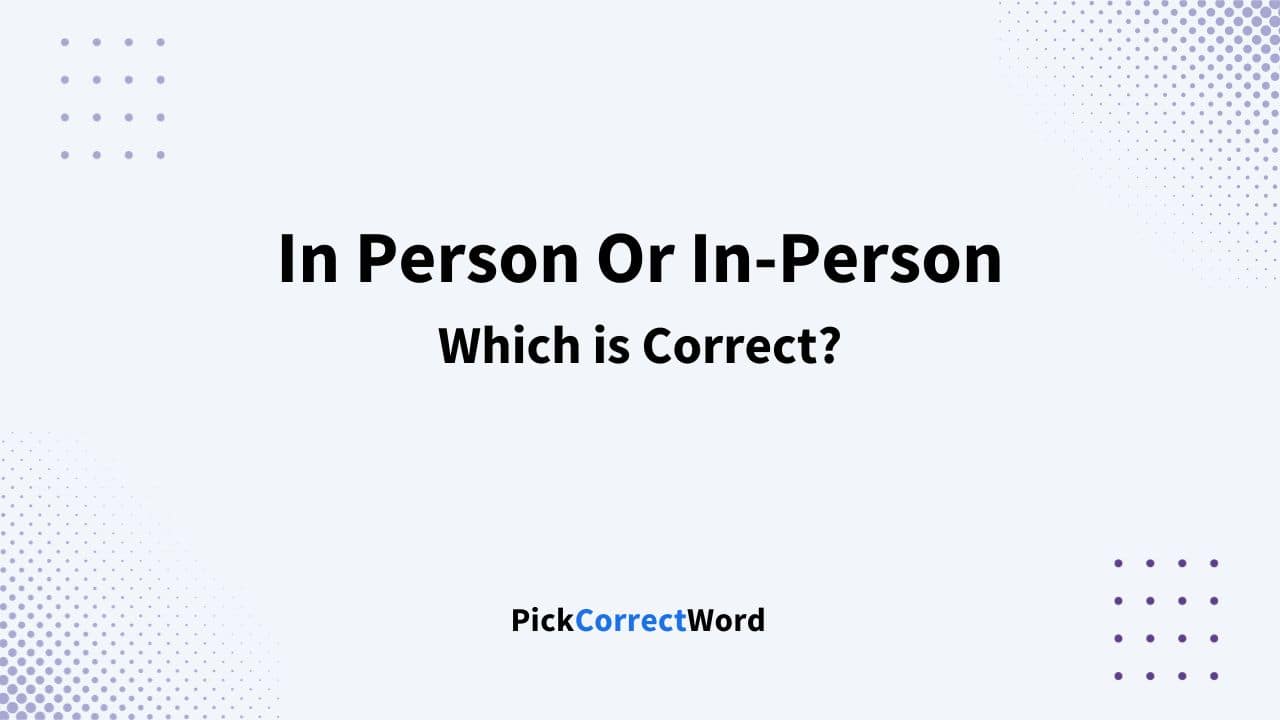In person and in-person are both correct but have different usages. These two phrases might seem alike, but they have distinct uses.
Use ‘in person’ when you’re referring to meeting someone or witnessing something directly, not via a screen or a phone call. It indicates the manner in which you meet or observe.
On the other hand, ‘in-person’ describes the type of event or situation, like an ‘in-person interview’ or an ‘in-person class’.
You might see these phrases used like this: an ‘in-person art exhibit’ or an ‘in person talk with a friend’.
So, neither phrase is incorrect, but using them correctly shows you know exactly how they fit into a sentence.
In Person Vs In-Person : Difference
The difference between “in person” and “in-person” comes down to their grammatical use, and the hyphen plays a big role in how you use them in English.
In person: What it Means and How to Use It
You mainly use “in person“ as an adverb. This means it describes a verb, or tells how something is done.
For example, if you meet someone in person, it means you’re physically present for the meeting.
In-person: What it Means and How to Use It
“In-person“, on the other hand, is a compound adjective that has a hyphen. You use it to describe a noun, showing the way in which something, like an event or service, happens.
When you go to an in-person event, it means you’re physically present at a specific place to participate. Here, it acts as an adjective that modifies nouns, such as in the phrase “in-person interview”.
The table below illustrates the difference and usage of the two phrases:
| Adverb (in person) | Adjective (in-person) |
|---|---|
| Face-to-face interaction | Description of an event requiring presence |
| “You’ll hand over the documents in person.” | “Your in-person appearance is requested.” |
Examples of Using In Person in a sentence
“You need to sign the documents in person.“
“When you interview, it’s best to do so in person.“
“You must appear in person at the embassy for your visa application.“
“You really should see the Eiffel Tower in person; photos don’t do it justice.“
“You can only appreciate the quality of the fabric by seeing it in person.“
“The band sounds even better when you hear them in person.“
“You must collect your package in person from the post office.“
“You are invited to attend the seminar in person to ask questions.“
“You should apologize in person to make it more meaningful.“
“If you can, always try the clothes on in person for the best fit.“
Examples of Using In-Person in a sentence
“You meet your friends in-person at the café every weekend.“
“Your interview is scheduled to be conducted in-person.“
“When you attend an in-person seminar, you engage more with the material.“
“You prefer in-person meetings to discuss important matters.“
“During the in-person training, you learn hands-on techniques.“
“You resolved the issue by visiting the store in-person.“
“To better understand the product, you requested an in-person demonstration.“
“You received the award at the ceremony in-person.“
“When you buy clothes, you like to shop in-person for the right fit.“
“Your in-person attendance at the workshop is required for certification.“
In Person Or In-Person: US Vs UK English
There’s no significant difference in how you use the phrases ‘in person’ and ‘in-person’ in UK English compared to US English. Both phrases are used to talk about an action or event where someone is physically there.
You usually use ‘in person’ as an adverb, showing someone’s physical presence.
For example: You’re expected to be at the meeting in person.
In contrast, ‘in-person’ acts as an adjective, changing a noun to show that something involves someone being physically there.
For example: She set up an in-person interview for the job.
Whether you’re using UK English or US English, your understanding of these phrases can remain the same. The situations in which you’d use ‘in person’ versus ‘in-person’ don’t change between these two versions of English.
Frequently Asked Questions
Are there instances where ‘in person’ should always be hyphenated?
Yes, ‘in person’ should be hyphenated when it functions as an adjective before a noun. For instance, in-person consultation means a consultation where individuals meet physically, as opposed to virtually.
What are the differences in meaning between an in-person meeting and an online meeting?
An in-person meeting involves face-to-face interaction where attendees are physically present in one location. In contrast, an online meeting occurs over the internet, using digital tools, allowing participation from remote locations.
How does the meaning of ‘in person’ change when referring to job positions or interviews?
When referring to job positions, ‘in person’ signifies roles that require physical presence, as opposed to remote or virtual positions. For interviews, in-person interviews imply a face-to-face meeting between the applicant and the interviewer, rather than a conversation conducted over phone or video conferencing.


